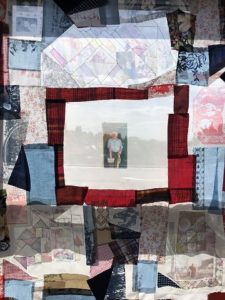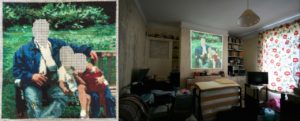Rebecca Whiteman: ‘Being Forgotten’
Rebecca Whiteman is an illustrator and art director in animation and recently completed an MA in Printed Textiles at UCA Rochester. As part of her research she interviewed Ana Baeza and Zoe Hendon about memory, museums, and the significance of objects.
Rebecca was particularly interested in how textiles frame family memory, forming a connection with people even when they are no longer with us. Her work explores the fragility of memory, which like textiles are liable to fade and deteriorate over time. Rebecca’s work also considers the ways in which our idea of ‘home’ – and especially our connection to our childhood home – may change as our parents age.
 My project, entitled ‘Being Forgotten,’ was triggered by my father’s Alzheimer’s diagnosis, making me acutely aware of the fragility of memory and how we often feel the need to try to contain and safeguard these memories. I explored this through the format of picture frames, which protect but also edit our personal stories.
My project, entitled ‘Being Forgotten,’ was triggered by my father’s Alzheimer’s diagnosis, making me acutely aware of the fragility of memory and how we often feel the need to try to contain and safeguard these memories. I explored this through the format of picture frames, which protect but also edit our personal stories.
I used slow craft techniques, like hand stitching and needlepoint, as a way of creating a physical record of the intangible, but also as a method of incorporating myself into the work. The collection that I produced for my final show is also a reaction to an ever more digital world, where the tangible is diminishing. I used my father’s old shirts and other family textiles to connect on a visceral level, and un-stitched canvas as a way of communicating memory loss by utilising the translucent properties of these fabrics to expand on negative space.
Through these hands-on processes, I discovered the importance of making, especially for meditating on my emotions about my father’s condition, and coming to terms with it. The hand sewing felt like a way of literally tying together my memories of him and connecting to him by physically realising my internal experiences. My project is based on very personal subject matter, but I am discussing it as a universal experience, hoping to unite people through sharing stories.

This work investigates the unravelling of memory through negative space, with it gradually expanding throughout the series.
We found Rebecca’s work very moving and thought provoking. You can read more about this project and her other work on her website https://www.rebeccawhiteman.com/